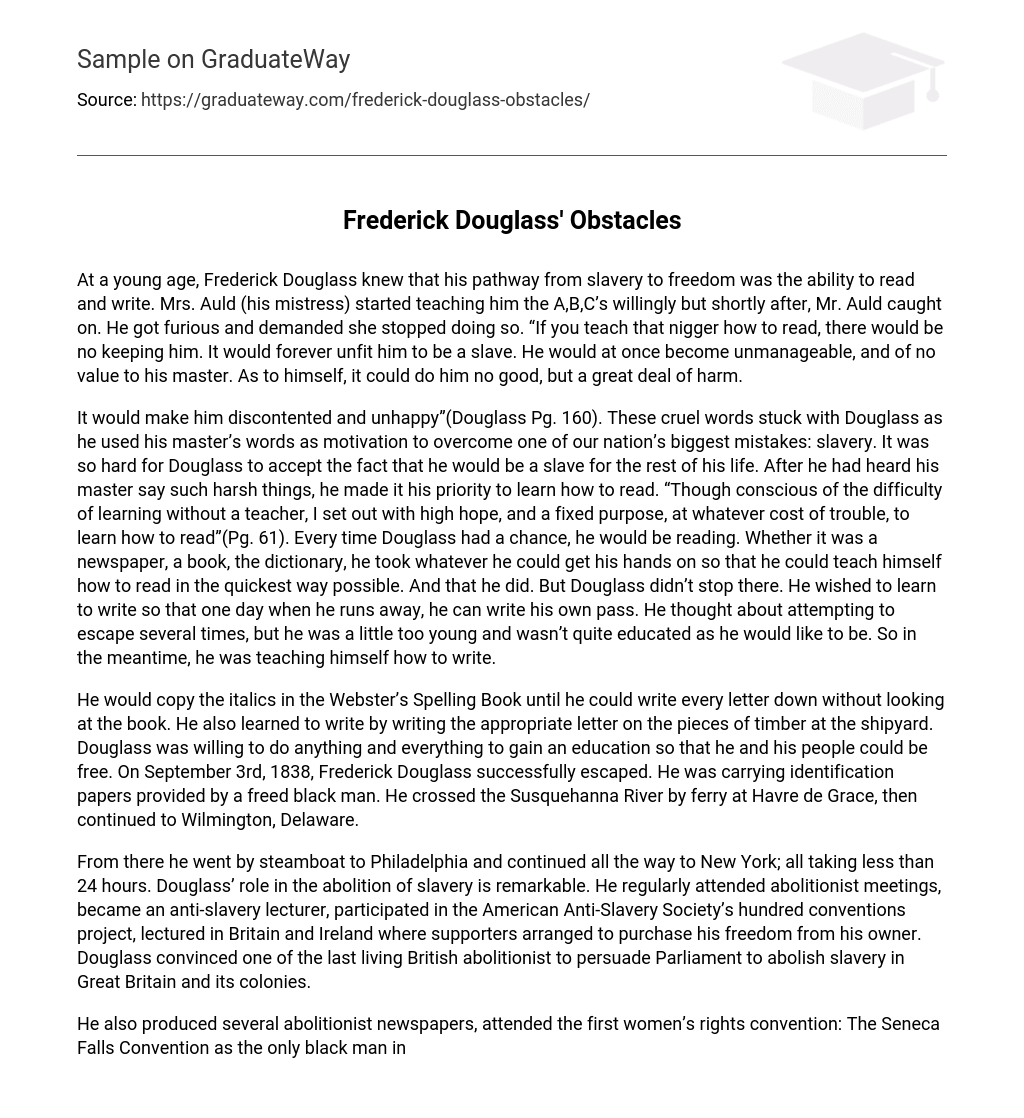At a young age, Frederick Douglass understood the importance of reading and writing as the key to his freedom from slavery. Initially, Mrs. Auld, his mistress, willingly taught him the A,B,C’s. However, Mr. Auld soon discovered this and became enraged, demanding that she cease her efforts. He believed that if Douglass learned how to read, he would become uncontrollable and useless as a slave, posing a threat to his master. Furthermore, Mr. Auld saw no benefit for Douglass himself, only potential harm.
According to Douglass (Pg. 160), the cruel words from his master caused him discontent and unhappiness, but he used them as motivation to overcome slavery, which is considered one of our nation’s biggest mistakes.
The idea of being a slave forever was difficult for Douglass to accept, so he made learning how to read his top priority. Despite not having a teacher, he approached this challenge with determination and perseverance, regardless of the obstacles he faced (Pg. 61).
Douglass took every opportunity to read, whether it was through newspapers, books, or dictionaries. He consumed literature in order to teach himself how to read as quickly as possible.
However, Douglass didn’t stop there; he also desired to learn how to write. His goal was to be able to write his own pass when the time came for him to escape.
Although he contemplated escaping multiple times, he recognized that he was too young and lacked enough education at that point. Therefore, in the meantime, his focus remained on teaching himself how to write.
Frederick Douglass diligently practiced writing the italics from the Webster’s Spelling Book, committing every letter to memory. Additionally, he honed his writing skills by inscribing the appropriate letters onto pieces of wood at the shipyard. Douglass was determined to obtain an education at any cost, as it would ultimately lead to his freedom and the liberation of his fellow people. Finally, on September 3rd, 1838, he successfully escaped with the help of identification papers provided by a freed black man. Douglass crossed the Susquehanna River via ferry in Havre de Grace, before continuing his journey to Wilmington, Delaware.
Traveling by steamboat, he went from there to Philadelphia and then all the way to New York, completing the journey in less than 24 hours. Douglass played a significant role in ending slavery as he regularly attended abolitionist meetings and became a lecturer against it. He also took part in the hundred conventions project organized by the American Anti-Slavery Society. Additionally, Douglass gave lectures in Britain and Ireland where his supporters arranged for his owner to sell his freedom. Later on, he convinced one of the few remaining British abolitionists to influence Parliament into abolishing slavery in Great Britain and its colonies.
Frederick Douglass, a remarkable individual who never gave up, produced various abolitionist newspapers and attended the Seneca Falls Convention, the first women’s rights convention. As the sole black man present at the event, Douglass advocated for desegregation of public schools and believed in utilizing the Constitution as a tool in the battle against slavery. It is truly astonishing to witness his unwavering perseverance through numerous trials. The hope, desire, and passion he possessed as an African-American male during that era continue to be a great inspiration to me.
Frederick Douglass, a champion for the rights of all black individuals and an advocate against slavery, fought tirelessly to end this inherent injustice. He recognized the power of education in uniting his fellow people and ensuring freedom for both current and future generations. Despite encountering numerous obstacles, Frederick Douglass remained steadfast in his beliefs and unwavering in his efforts. His legacy as an enduring hero in American history is forever etched, serving as a testament to his pivotal role as an African-American figure fighting against slavery.
References
http://www.pbs.org/wgbh/aia/part4/4p1539.html
The website http://www.history.rochester.edu/class/douglass/part1.html is a valuable resource.





